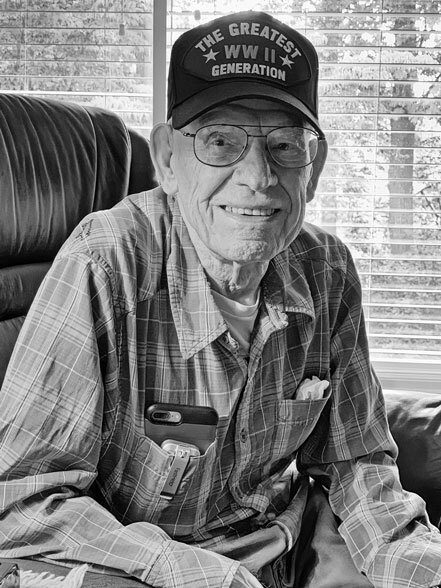
Jan. 25, 1920-Sept. 21
On Wednesday, Sept. 21, Fred Vogel died peacefully at Pagosa Springs Medical Center. Fred was 102 years and nine months old when he died and had his daughter and son-in-law, Ann and Ron Bubb, by his side.
Fred lived the last year of his life quietly in Pagosa Springs, enjoying the buzz of the local social scene through Ron and Ann, long-term residents of Pagosa Springs. Many didn’t realize that during this time we had a rare treasure in our midst, because Fred was one of the last remaining World War II veterans.
Fred served in the U.S Air Force in WWII, graduating from engineering and gunnery schools, and leaving with his bomber squadron from Florida to Puerto Rico on a two-week journey over Christmas and New Year in 1942/1943, finally landing in Cairo, Egypt, and then heading into the Sahara desert in Libya, where he almost froze to death the first few nights. From there, Fred flew missions in B25s in support of General Montgomery’s 8th Army, driving General Rommel’s Desert Rats through Africa back towards Sicily and Italy, and to the coast.
“We would drop 500-pound bombs on the German army when they dug in to stop the advance of the 8th Army. Rommel would dig in tanks when they ran out of gas and could no longer take the tanks along on his retreat. We put 3-foot rods (stingers) on the nose of the bombs to make them explode above ground and these 500 pounders shook them up (at least the ones who lived through the pounding). It was Rommel’s Desert Rats that named our outfit (the B25s) ‘The Earthquakers’ because of this.”
It was from the Libyan desert that Fred watched the intense fighting in the battle for Tobruk, having been grounded with his crew to wait for planes and serve as mechanics for those squadrons flying. Fred notes, “I can’t say I wasn’t sorry after I saw the planes come back from those missions full of holes.”
After heading to Sicily and then Italy, Fred was sent to India, where he suffered a severe bout of malaria. He eventually was sent home via Iran (Persia), Egypt and Bermuda, before landing on USA soil in Miami, Fla., on Jan. 16, 1945 — two years after departing. He had a memorable meal of a hamburger and strawberry milkshake at the airfield, and added that two of the highlights from his service travels were flying over the huge pyramids in Egypt and seeing the Taj Mahal in India (which he said is really, very white).
Fred P. Vogel, staff sergeant, U.S. Air Force, was honorably discharged from the 335th AAF Base Unit Squadron ‘O’ and was in the following battles: Egypt, Libya, Tunisia, Sicily, Naples, Foggia, India, Burma. He received the following: Distinguish Unit Badge GO 23 HQ WD 44; one service stripe; Good Conduct Ribbon; European Africa Middle East Theater Ribbon with four bronze Battle Stars; Asiatic Pacific Theater Ribbon with one bronze battle star.
Fred was very proud to have pitched a no-hitter during downtime league play between missions and was delighted to learn a reporter from “The Stars and Stripes” was there to witness it. After his discharge on July 25, 1945, he was then instrumental in opening the El Paso VFW. Afterward, he worked for Lester Pfister and the Pfister Hybrid Corn Company [as sales/office manager] for the next 50 years. He loved his family and never knew a stranger, reveled in meeting new people and being the center of attention. Although the love of his life was his wife, Pat, the Chicago Cubs were a very close second.
Fred had a zest for life, surviving colorectal cancer at 99.9 years old and having a pacemaker implanted four days after turning 100. He trusted his life to Jesus and was a member of Saint Mary’s Catholic Church in El Paso, which is where his funeral Mass was held. Burial with military rights followed at Saint Joseph’s Catholic cemetery in El Paso.
A moving Celebration of Life was held at the Veterans Memorial Park in Pagosa Springs on Saturday Nov. 20, with veterans from the American Legion Mullins-Nickerson Post 108 conducting a moving flag-folding ceremony. Those of us who met and visited with Fred during his final days in Pagosa Springs count ourselves fortunate. His youthful enthusiasm and celebratory nature lifted our spirits, and we are grateful to him for his service to our country: a relatively short time that deeply shaped and impacted a very long life.